
"Snow White" is a German fairy tale, first written down in the early 19th century. The Brothers Grimm published it in 1812 in the first edition of their collection Grimms' Fairy Tales, numbered as Tale 53. The original German title was Sneewittchen; the modern spelling is Schneewittchen. The Grimms completed their final revision of the story in 1854, which can be found in the 1857 version of Grimms' Fairy Tales.
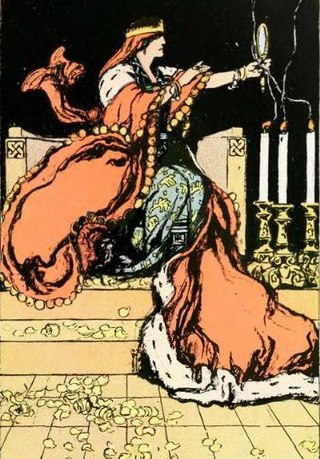
The Evil Queen, also called the Wicked Queen or the Queen, is a fictional character and the main antagonist of "Snow White", a German fairy tale recorded by the Brothers Grimm. The most popular adaptation of the Evil Queen is from Disney's SnowWhite. The character has also become an archetype that has inspired unrelated works.
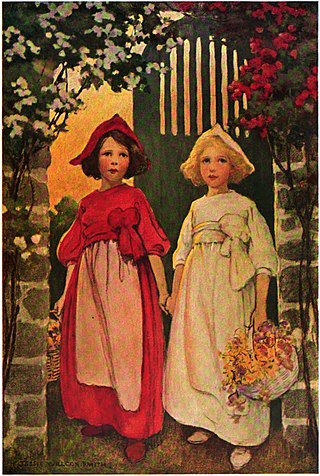
"Snow-White and Rose-Red" is a German fairy tale. The best-known version is the one collected by the Brothers Grimm in 1837 in the third edition of their collection Grimm's Fairy Tales. It was first published by Wilhelm Grimm in 1827 in Wilhelm Hauff's Märchen-Almanach. An older, somewhat shorter version, "The Ungrateful Dwarf", was written by Caroline Stahl (1776–1837). Indeed, that appears to be the oldest variant; no previous oral version is known, although several have been collected since its publication in 1818. Oral versions are very limited regionally. The tale is of Aarne-Thompson type 426.
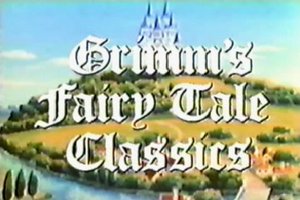
Grimm's Fairy Tale Classics, also known as Grimm Masterpiece Theater in the original version and The Grimm's Fairy Tales, is a Japanese anime anthology series by Nippon Animation based on the Grimms' Fairy Tales.
Snow White is a popular fairy tale.
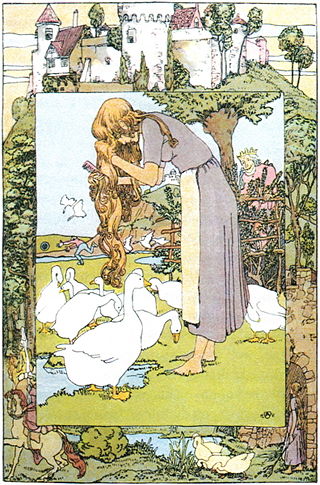
"The Goose Girl" is a German fairy tale collected by the Brothers Grimm and first published in Grimm's Fairy Tales in 1815. It is of Aarne-Thompson type 533.
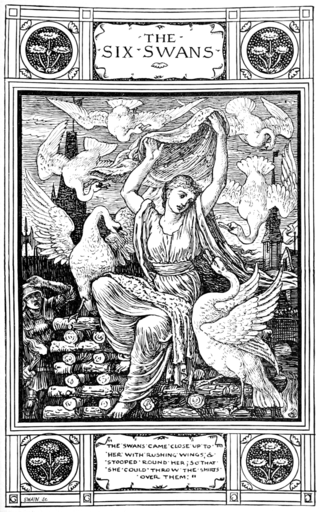
"The Six Swans" is a German fairy tale collected by the Brothers Grimm in Grimm's Fairy Tales in 1812. It is of Aarne–Thompson type 451, commonly found throughout Europe. Other tales of this type include The Seven Ravens, The Twelve Wild Ducks, Udea and her Seven Brothers, The Wild Swans, and The Twelve Brothers. Andrew Lang included a variant of the tale in The Yellow Fairy Book.

Snow White: The Fairest of Them All is a 2001 fantasy adventure television film co-written and directed by Caroline Thompson and produced by Hallmark Entertainment. The film was first released theatrically in Europe, and subsequently aired in the United States on ABC as part of their series on The Wonderful World of Disney on March 17, 2002.

The Seven Dwarfs are fictional dwarfs in the 1812 fairy tale Snow White by the Brothers Grimm and other renditions and adaptations.

The Little Red Riding Hood fairy tale has often been adapted, and into a wide variety of media.
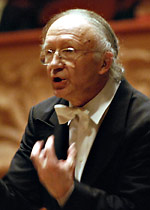
Schneewittchen is an opera by Heinz Holliger. He wrote the libretto based on a poetic text by Robert Walser in iambic trimeter. The opera received its première on 17 October 1998 at the Zürich Opera House which had commissioned the work. The work is a psychoanalytical reworking of the fairy tale of "Snow White", analysing the complex relationships between the roles. It is not a children's opera.

Snow White and the Seven Dwarfs is a 1955 West German film, directed by Erich Kobler, based on the 1812 story of Schneewittchen by the Brothers Grimm.

Mirror Mirror is a 2012 American fantasy comedy film based on the fairy tale, "Snow White," collected by the Brothers Grimm. The film follows a beautiful princess named Snow White, who uses the help of a band of seven dwarfs as well as a prince, to reclaim her throne from her wicked stepmother, the enchantress Clementianna.

Snow White & the Huntsman is a 2012 American fantasy action-adventure film based on the German fairy tale "Snow White" compiled by the Brothers Grimm. The directorial debut of Rupert Sanders, it was written by Evan Daugherty, John Lee Hancock, and Hossein Amini, from a screen story by Daugherty. The cast includes Kristen Stewart, Charlize Theron, Chris Hemsworth, Sam Claflin, and Bob Hoskins in his final film performance. In the film's retelling of the tale, Snow White grows up imprisoned by her evil stepmother, Queen Ravenna, a powerful sorceress. After Snow White escapes into the forest, Ravenna enlists Eric the Huntsman to capture her, but he becomes her companion in a quest to overthrow Ravenna.
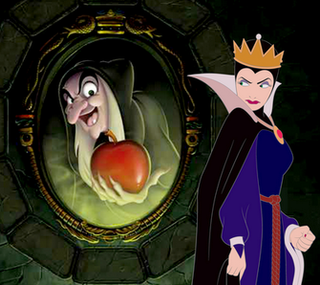
The Evil Queen, also known as the Wicked Queen, Queen Grimhilde, or just the Queen, is a fictional character who appears in Walt Disney Productions' first animated feature film Snow White and the Seven Dwarfs (1937) and remains a villain character in their extended Snow White franchise. She is based on the Evil Queen character from the 1812 German fairy tale "Snow White".
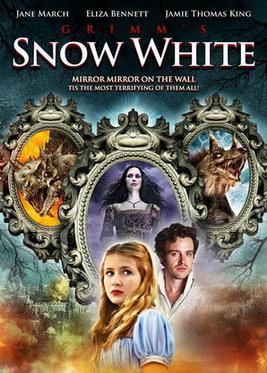
Grimm's Snow White is a 2012 American fantasy film produced by The Asylum and directed by Rachel Lee Goldenberg. Loosely based on the Brothers Grimm fairy tale Snow White, the film stars Jane March, Eliza Bennett and Jamie Thomas King.
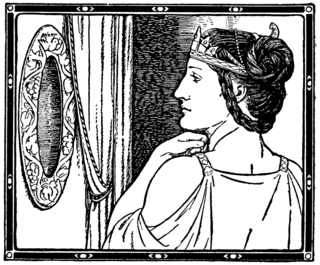
The Magic Mirror is a mystical object that is featured in the story of Snow White, depicted as either a hand mirror or a wall-mounted mirror.
The New Adventures of Snow White is a 1969 West German sex comedy film directed by Rolf Thiele and starring Marie Liljedahl, Eva Reuber-Staier, and Ingrid van Bergen. The film puts an erotic spin on three classic fairy tales Snow White, Cinderella and Sleeping Beauty. It exemplified the downturn in the career of Thiele who earlier in the decade had still been a mainstream director, but increasingly found himself making lower-budget sex comedies.
"Snow White" is a German fairy tale known across much of the world. There has been debate over possible origins of the tale and whether it could be an amalgam of other stories, have mythical roots, or be inspired by a real person. It falls within the classification of Type 709 in the Aarne–Thompson–Uther Index.
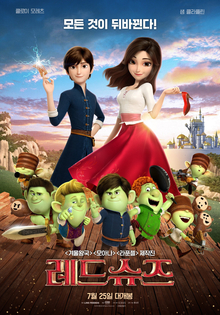
Red Shoes and the Seven Dwarfs, known in Korean as simply Red Shoes, is a 2019 English-language South Korean animated fantasy film produced by Locus Corporation. It is based on the 1812 German-language fairy tale "Snow White" by the Brothers Grimm, and its name is derived from the 1845 Danish fairy tale The Red Shoes by Hans Christian Andersen. The film features the voices of Chloë Grace Moretz, Sam Claflin, Gina Gershon, Patrick Warburton, and Jim Rash.

















